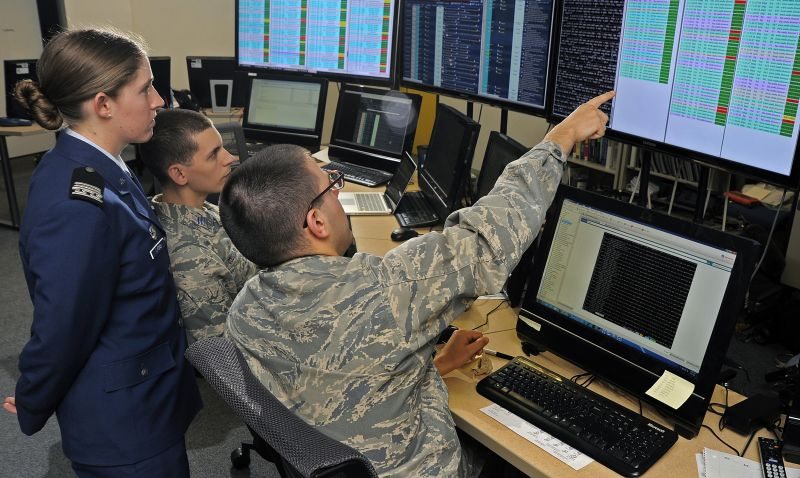Air Force cadet cyber warriors swept the virtual floor with the competition in the 12th annual Cyber Defense Exercise here April 16-20.
The Cyber Defense Exercise is a network security competition during which service academy cadets and Defense Department post-graduate students manage and defend computer networks and maintain services against simulated intrusions by the National Security Agency’s “red cell” aggressor team.
During the competition, NSA network specialists and military network experts formed the red cell team that challenged cadet blue cell teams to defend a closed-computer network that the cadets designed, built and configured at their respective academies. NSA personnel graded each team’s ability to maintain network services while dealing with security intrusions.
The exercise took place at the NSA’s Fort George G. Meade, Md., headquarters and at each of the academies on virtual, private networks, providing a safe path for the exercise while preventing interference with real-world networks.
Air Force Academy cadets put a great deal of work into preparation for the competition.
“It was quite a marathon,” said Air Force Cadet 1st Class Jordan Keefer of Cadet Squadron 37. “For most of us this is a hobby, so it was a lot of work, but it’s what we like to do.”
But the cadet team didn’t have time to celebrate their victory before they hopped on a plane to participate in the National Collegiate Cyber Defense Competition in San Antonio April 20-22. Their tenacity earned them second place in the competition, finishing behind the University of Washington, which won for the second straight year.
“By the time we started the second competition, the challenge wasn’t the computers” Keefer said. “It was maintaining our motivation; but I feel like we did that.”
Dr. Martin Carlisle, the cyber competition team coach, was extremely proud of his team’s efforts in both competitions.
“One thing that we’re particularly proud of is these cadets are a very new team,” Carlisle said. “We’ve only been a team formally for one year now, and they’ve gone from nothing to not only beating all the other service academies, but also the graduate schools. And then, totally fatigued from that, they went directly to the national competition. They competed against teams that could have up to two graduate students and still came in second against 10 regional finalists from more than 100 teams across the country.”
The cyber competition team was established in August 2011. In the past, cadets from senior-level classes and the cyber warfare club competed in cyber competitions, but this is the first year the Academy has had a dedicated cyber team, Carlisle said.
“They’ve made amazing progress over the last year and we’re really proud of what they’re going to do to defend our nation and the Air Force in the future using the skills they’ve learned,” Carlisle said.
The skills they learn are numerous. During the competitions, teams are assessed on their ability to maintain network services while detecting and responding to network intrusions and compromises. They are also graded on their ability to maintain an exchange server, ftp server, Web server and domain controller. They also must submit timely and accurate incident reports as they detect red cell activity.
The cadets will take the skills they develop in the cyber program to their careers in the Air Force.
“When I first got to the Academy, I wanted to fly,” Keefer said. “But then I took the basic cyber course and attended my first competition, and I’ve been hooked ever since. There are so many challenges in the cyber field.”
Carlisle expressed his pride in the cadets’ accomplishments and his belief in the merits of the program.
“One of the exciting things about the cyber team is that their efforts will matter in the defense of the nation,” he said. “These people are learning skills that are going to be essential to the defense of the nation.”
The Academy team competed for the trophy and bragging rights against competitors from the U.S. Naval Academy, U.S. Coast Guard Academy and U.S. Military Academy. Teams from the Royal Military College of Canada and Air Force Institute of Technology also competed, but weren’t eligible for the trophy.
The final scores of the Cyber Defense Exercise were:
- U.S. Air Force Academy – 71.78
- Air Force Institute of Technology (1)* – 71.65
- Air Force Institute of Technology (2)* – 65.80
- Royal Military College (Canada)* – 64.08
- U.S. Military Academy – 64.04
- U.S. Naval Academy – 56.71
- U.S. Coast Guard Academy – 48.91
* Post-graduate teams were not eligible for the Cyber Defense Exercise championship.











